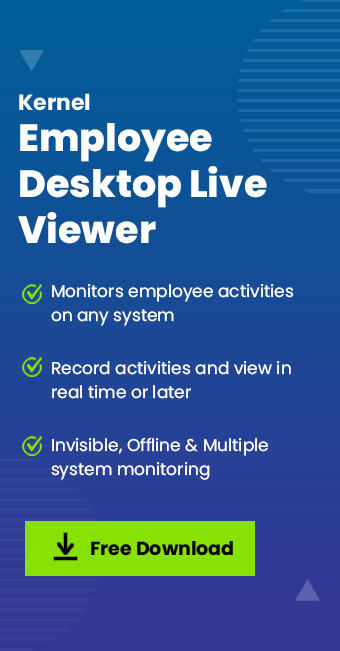Read time: 8 minutes
Regarding children and the education system during the COVID-19 pandemic, we can view it as a significant evolution. It has demonstrated that learning can transcend physical distance, embracing virtual methods of reaching students.
While virtual classes have ensured uninterrupted education during challenging times, they have also lured children towards online games, adventures, creative pursuits, shows, series, and movies. The vast online content can be captivating, often leading to distractions and loss of focus.
The prolonged screen time on computers, tablets, and Android phones has raised significant concerns regarding the declining mental and physical health of children. This extended exposure adversely affects eyesight, posture, physical activity, and psychological well-being. Moreover, it exposes children to various other vulnerabilities.
In this blog, we will delve into the reasons behind and methods of monitoring your child’s computer activities.
Things to be Monitored:
- Personal Information Sharing
Children often lack the awareness that they should refrain from disclosing their personal information to unfamiliar individuals. They might inadvertently share such details with online strangers who can exploit this information through fraudulent means or by assuming false identities. This could potentially lead to real-world contact, posing a significant threat to the child’s safety and security. - Damage to Reputation
Children may sometimes share content online that could harm or damage the reputation of their peers, potentially creating future obstacles for them in various aspects of their lives. - Theft of Identity
Children are innocent and may inadvertently share personal information without realizing the risks involved. If this information falls into the wrong hands, it could be used to gain access to sensitive details like bank accounts and credit cards, leading to potential misuse. - Virus/Malware Attacks
Downloading games from untrustworthy sources or visiting unreliable websites can result in accidental downloads of viruses, malware, or Trojans onto your device. Children may not be aware of the credibility of such games and sites, so it’s essential to educate them about these risks and monitor their online activities closely. - Abuse of chat
Online harassment involves sending explicit text, nude photos, or pornographic material via mobile phones or emails. Younger children might engage in this behavior for various reasons, such as peer pressure or thinking it’s trendy. Detecting such activities often requires observing unusual behavior like extended online hours and a desire for complete privacy. Close monitoring of your child’s online activities is essential in identifying and addressing these issues. In such cases, a kids’ computer activity monitor, like the one used by organizations to monitor employee skype chat conversations for security purposes, can be a valuable tool to safeguard your child’s online interactions, including WhatsApp and other social media chats. - Online Bullying
Cyberbullying is an extension of traditional schoolyard bullying, manifesting as negative, mocking, or hurtful comments on social media, the online dissemination of embarrassing photos or videos without consent, and more. This behavior can lead introverted or emotionally vulnerable children into mental distress and social withdrawal, often without their parents’ knowledge. In some cases, children may engage in bullying others. Monitoring your child’s online activities is essential to uncover such issues, as it programs to track Windows computer and user activity, similar to keyloggers used for monitoring. - Abetting Dangerous Games
Online individuals or games can incite, encourage, or coerce your child into engaging in illegal activities, participating in dangerous challenges, or even contemplating self-harm or suicide. Regrettably, several challenging games have tragically resulted in the loss of young lives. Just as organizations engage in Employee monitoring for security purposes, parents must also monitor their children’s online activities to ensure their safety and well-being while using computers. - Company of miscreants
It’s crucial to stay vigilant regarding your child’s peer group. Observing the actions and behavior of each individual within their social circle can help you assess whether it’s a positive influence. Additionally, it’s important to identify any troublemakers who might be negatively impacting or influencing others within the group. - Cyber Predators
It’s impossible to predict if someone is approaching your innocent child with harmful intentions. Such predators may view your child as a potential target for various sinister motives, including kidnapping for ransom, seeking revenge, or involvement in human trafficking. Therefore, safeguarding your child’s safety should be your top priority, and parents should exercise extra caution if they suspect any such possibilities. - Wastage of time
Lastly, it’s crucial to set reasonable limits on your child’s online screen time to safeguard their physical and mental well-being. Excessive screen time can lead to eye strain and vision issues, making it essential to strike a balance.
Common ways to monitor your child’s online activities
Before considering the use of monitoring tools for your child’s internet activities, it’s imperative to have an open conversation with your child. Ensure they are fully aware of both the advantages and disadvantages of internet usage.
Empower your children by educating them about potential vulnerabilities and online risks. It’s crucial not to panic; instead, assure them that you are always available to provide guidance and support.
If your child is mature enough to grasp these concepts, acquaint them with various forms of child exploitation, such as physical, mental, sexual, and financial exploitation. Teach them self-security measures and solutions to stay safe.
In essence, always be there for your child, supporting their needs and answering their questions, even in the best of times, to alleviate their anxieties and worries. Strive to be their trusted confidant, ensuring they feel comfortable sharing anything with you.
You should be extra-cautious about their activities and keep an eye if you suspect anything fishy or find your child suspiciously restless.
Ultimately some ways to monitor your child’s online activities are discussed below briefly:
- Try yourself first
Help your child while he is trying to download a game or App. Better play and view the game and App before your child does. - Filter internet usage
To safeguard your child’s online experience, configure their iOS and Android profiles on all accessible devices at home. This enables safe filtering of websites, pages, apps, and games, permitting only child-friendly content. Additionally, you can set limits on internet usage time and data size to maintain control and moderation. - Get notifications
To ensure your child’s online safety and facilitate healthy communication, consider setting up email accounts for them on reputable providers such as Gmail or Yahoo. These platforms typically allow account creation for individuals aged 13 and above. By doing so, you can implement features that allow you to receive copies of their emails, providing you with insights into their contacts and communications. This proactive approach can foster a supportive digital environment for your child. - Check regularly your child’s social media account if it exists.
It’s advisable to create your own account on the same social media platforms like Facebook, Instagram, Twitter, etc., if your child has one. This way, you can be their friend on these platforms and keep a watchful eye on their posts, as well as their friend list. This proactive approach helps ensure their online safety and fosters open communication. - Know and follow TV Parental Guidelines & V-chip
The TV Parental Guidelines serve as a valuable tool for parents to identify which programs and movies are suitable for specific age groups. These ratings are provided below for your convenience: - Know and follow ratings of Video Games and Apps
The Entertainment Software Rating Board (ESRB) assigns ratings to a wide range of video games and some apps, providing guidance on their content, including elements like intense violence, graphic sexual content, nudity, depiction of alcohol and drug use, scenes of bloodshed, and strong language.
| SR. NO. | GRADE/RATING | AUDIENCE | CONTENT |
|---|---|---|---|
| 1 | TV-Y | All children | Appropriate for kids |
| 2 | TV-Y7 | 7 Years and above | Little Fantasy Violence(FV) &/or Comic Violence |
| 3 | TV-Y7-FV | 7 Years and above | More FV as compared to TV-Y7 |
| 4 | TV-G | All age | Little/no Violence(V) Some Sexual Dialogue/content(S) Some Strong language(L) |
| 5 | TV-PG | Parental Guidance suggested | V- moderate S- some L- occasional Suggestive Dialogue(D)- some |
| 6 | TV-14 | Not below 14 Years | V-Intense S- Intense L-Strong D- Intense |
| 7 | TV-MA | Mature Audience (not below 17 years) | V-Graphic, Intense S-Intense L- Crude and strong D-Intense |
V-Chip: It is present in all new TV sets with screens 13″ and more.
Since TV sets made before 2000 are not present, you can use a set-top box meant for using V-Chip.
The V-Chip function enables you to display only programs that have been filtered based on their ratings, while blocking others. It’s important to note that news, sports, and commercial advertisements may sometimes contain content that is not rated and therefore not filtered by the V-Chip. Stay vigilant and exercise caution in such cases.
The list is long, but we have briefly given a superficial view of the same for your knowledge.
| SR. NO. | GRADE/RATE | AUDIENCE | CONTENT |
|---|---|---|---|
| 1 | C | Early Childhood | For young children |
| 2 | E | Everyone | Cartoon- little Fantasy Violence-little Language-mild |
| 3 | E 10+ | Everyone 10+ | Cartoon-more Fantasy- more Violence-mild Language-Mild Suggestive themes-little |
| 4 | T | Teens (13+ years) | Violence-some Humor-crude Suggestive themes-little Blood-little Gambling-simulated Strong language-some |
| 5 | M | Mature (17+ years) | Violence-intense Blood-more Wounds-more Sexual content Strong Language- |
| 6 | A | Adult (18+ years) | Violence-intense and prolonged Sexual content-graphic Gambling-with real currency |
Conclusion
In this blog, we’ve emphasized the importance of parents actively monitoring their child’s online activities in order to identify and block inappropriate content. We’ve also discussed strategies for effective communication and understanding with your child. However, it’s important to acknowledge that there may be instances where children do not readily share their online activities. In such cases, vigilant parents explore available solutions. One highly reliable, powerful, and user-friendly employee Monitoring tool is the Kernel Employee Desktop Live Viewer, a stealthy keylogger that captures desktop screenshots at specified intervals, providing a clear view of the user’s computer activity. Additionally, it can track login times and passwords by recording every keystroke. This tool can be a dependable ally for parents. We trust that this blog has provided you with valuable insights and helped alleviate some of your concerns as a parent.







